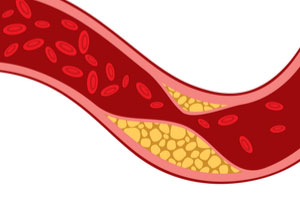Cholesterol and Your Well-Being

While most of the time when cholesterol is mentioned, everyone thinks of the detrimental effects it can have on health. The truth is cholesterol is a part of each and every cell in your body and it can have a negative effect on you, but cholesterol can also be beneficial to your health. High-density lipoprotein (HDL), the good cholesterol, provides positive impacts to health while Low-density lipoprotein (LDL), the bad cholesterol, is linked to several medical conditions like high blood pressure and heart disease.
Cholesterol Defined
Cholesterol is a fat like substance that is produced by the liver. In addition, cholesterol is produced by the body from the saturated fat in foods like red meat, eggs, and dairy products. Cholesterol makes its way through the body via the bloodstream while attached to lipoproteins. At the appropriate levels, cholesterol acts a crucial nutrient in the body that generates Vitamin D, produces hormones (including estrogen and testosterone), supports cell wall structure, and manufactures acids which aid in digestion.
Types of Cholesterol
Cholesterol’s complexity is classified by its shape and size as well as its positive or negative effect on the body. The two classifications, as mentioned above, are Low-density lipoprotein (LDL) which is detrimental to health, and High-density lipoprotein (HDL) which is beneficial to health. LDL can cause the accumulation of plaque in the arteries, restricting blood flow and increasing the risk of high blood pressure as well as stroke and heart disease. These blocked arteries also impede the flow of oxygenated blood to the remainder of your body. As LDL levels increase so does the risk of heart disease. HDL removes excess cholesterol along with other harmful byproducts from the body via the liver.
Have Your Cholesterol Tested
Your doctor’s office or clinic can order a cholesterol screening for you. This blood test is known as a lipoprotein panel which will determine your total levels of cholesterol and triglycerides, as well as the individual levels of LDL and HDL. There are ranges of cholesterol levels which are considered normal, but your desired levels will vary with your personal circumstances. Knowing your levels allows you and your doctor to keep your cholesterol in the healthy recommended ranges, reducing your risk of heart attack and stroke.
Lowering your Cholesterol
If your screening reveals your cholesterol is above normal, there are changes you can make to improve your levels. Choosing healthy foods like vegetables, fruits, whole grains, and healthy fats while limiting cholesterol laden foods like dairy products, baked goods, fried foods, processed foods, and red meat. Exercise, as well as losing weight, can help lower LDL and raise HDL levels. If you smoke, stopping will help you lower LDL and raise HDL.
The Role of Genetics
Because genetics has a role in the amount of cholesterol your body produces, your body could generate too much cholesterol and be unable to remove the excess cholesterol from your body making your levels difficult to control. If this is true for you or if you have a family history of high cholesterol and heart disease, you should maintain a healthy lifestyle and visit your physician regularly to have your cholesterol checked.
Manage Your Cholesterol
If your HDL is low or your LDL is high, your physician will recommend lifestyle changes or prescribe medication to help you manage your cholesterol levels. Your doctor will select your medication based your lab results as well as your age and medical history. If you have concerns about your cholesterol, your medication, or lifestyle changes to help you maintain your health and well-being.
